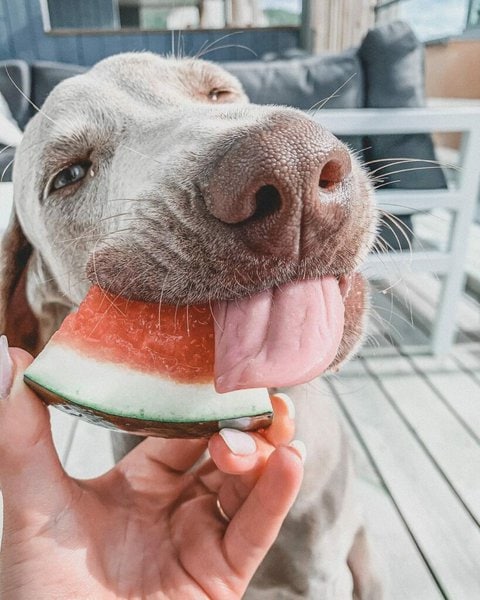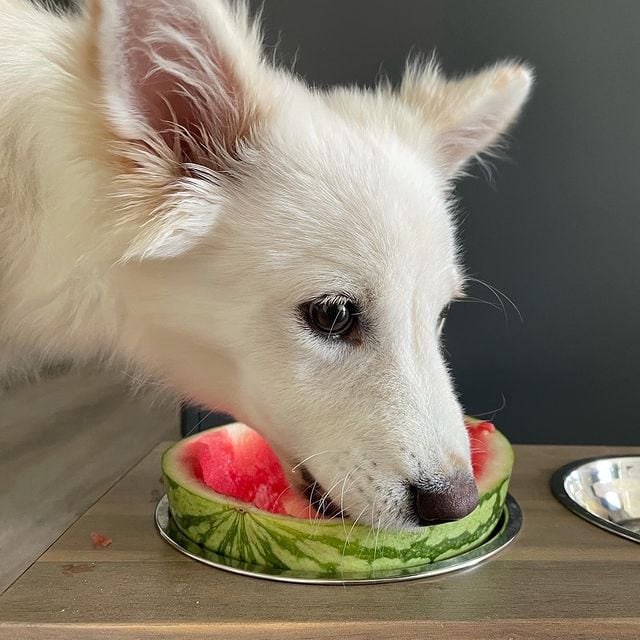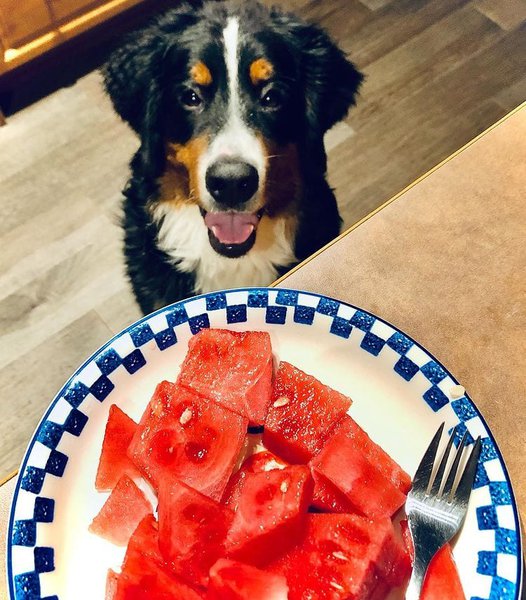Dog owners are often concerned about the safety of the fruits they feed their dogs, watermelon inclusive. Given its popularity in the United States, especially during summers, the question you may want to ask is whether dogs can eat watermelons, too.
The answer is a resounding “Yes.” Dogs can eat watermelons because they are a healthy and hydrating treat. Before feeding, apart from ensuring the watermelon is not rotten, you have to get rid of both the rinds and the seeds to avoid a gastrointestinal upset.
There are also other conditions to meet before this fruit can be perfectly safe for your pooch. But what do those conditions entail, and how easy or difficult are they to meet? Journey with me in this article as I walk you through them.
Interestingly, you will also learn the key benefits of this fruit to your beloved pup and the possible side effects should your furry friend abuse it. First, let’s start with what happens when dogs eat watermelons.
What Happens If Dogs Eat Watermelons?

Nothing harmful happens to your dog if it eats watermelon. Instead, your four-legged friend gets several health benefits from consuming this fruit because it contains significant nutritional components.
Watermelon is an excellent treat for dogs because the fruit is almost entirely composed of water. Because it is hydrating, it helps to replenish lost fluid and energy when your dog is running around in the heat of summer.
It is also low in calories and includes no fat or cholesterol, making it an excellent choice for active dogs.
Apart from being a source of hydration, watermelons also contain many vitamins and minerals. A few of the positive changes you will notice in your pup if you treat it to this fruit are as follows:
- It will keep your dog’s coat and skin in excellent shape because of the vitamin A presence.
- Vitamin B6 will guarantee that your dog’s internal organs remain robust and healthy.
- It will help to strengthen your pet’s immune system and ward against colds before they begin to spread.
- You will notice the proper functioning of your dog’s muscles and nerves. Also, it ensures that fluids circulate throughout their body and keep their joints supple because of its potassium.
After considering all of these, it is difficult to conceive that watermelons have any negative aspects. Nevertheless, don’t lose sight of the fact that the fruit contains a lot of sugar, as overeating can put your dog at risk of acquiring diabetes.
Before we dig deeper, let’s beam our searchlight on the specific benefits of this water-filled fruit to your dog.
How Does Watermelon Benefit Dogs?
Watermelon without the rind and seed serves as a good source of hydration. Also, it strengthens the immune system and gives your canine buddy enough fluid and energy.
Watermelon is a fantastic source of vitamins A, C, B6, and B1 and calcium and potassium. They all assist in strengthening the immune system of your canine companion.
According to the United States Department of Agriculture, watermelons contain approximately 92% water. So, offering your dog a watermelon snack on a hot day can help them stay hydrated.
A cup of diced, seedless watermelon is perfectly alright for your dog at a time. However, remember to remove the seed and rind and give it in moderation. Below are the known advantages of dogs consuming watermelons.
- It helps to boost the immune apparatuses of your canine.
- Watermelon can restore the health of injured tissues in dogs.
- It prevents free radicals from stealing electrons from other cells, reducing cancer risk in dogs.
- This fruit increases the serotonin in the brain, blood platelets, and bowel movements.
- It encourages good eye health in dogs.
- Watermelon aids the functions of muscles by making them stronger.
- Your dog can maintain healthy blood pressure levels with this fruit.
- It helps lower the risk of cardiovascular diseases.
If your dog is suffering from an inflamed pancreas known as pancreatitis, you may want to be hesitant in feeding it with watermelons. But should you worry about this, or are watermelons safe for dogs with pancreatitis? Check below for the answer.
Can Dogs With Pancreatitis Eat Watermelon?
Yes, dogs with pancreatitis can eat watermelons. As already noted, this fruit is mainly water with a healthy mix of beneficial vitamins and minerals. It doesn’t contain anything that can cause pancreatitis in dogs or worsen it.
Because watermelon does not contain fat, it is suitable for dogs suffering from pancreatitis. Fiber and potassium are also present in this fruit. These nutrients are beneficial to the digestive tract and helpful for dogs suffering from pancreatitis.
However, you should remove both the rinds and the seeds (even the pale seeds found in seedless watermelons) before feeding the fruit to your dog suffering from pancreatitis because they might cause choking or intestinal blockage.
Does Watermelon Make Dogs Poop Red?
Yes, your dog’s poop can turn red after eating watermelon in large quantities. Poops – whether from humans or pets – generally take the color of the food ingested.
There is little to worry about if your dog’s poop shows red if there is no health concern. You only have to monitor the amount of watermelon your dog consumes to prevent diabetes and other health challenges.
Remember, dogs should primarily feed on their healthy food portion and not replace anything with it, no matter how good.
Can Dogs Eat Watermelon Rinds?

No, dogs should not eat watermelon rinds. The rind is the green outer part or skin of the watermelon, which many people consume with the reddish inner portions.
Let’s get something clear here. The rind contains plenty of vitamins with low calories. In fact, for humans, it is advisable to eat the skin with the sweet inner component.
However, dogs would find it challenging to digest because it is hard and less hydrated. When ingested by your dog, it can cause a blockage of the digestive pathway, as well as choking hazards and diarrhea or an upset stomach in the process.
It is better to keep the green outer part of watermelons away from your dogs for the reasons above. But what if the deed has been done? That is, your dog has consumed this part. What should you do? Let’s consider this below.
What Should I Do If My Dog Eats Watermelon Rind?
It depends on the quantity. If it is minimal, you may only have to watch it for a while. However, if your dog eats a substantial portion of the rind, you need to inform your vet straightaway.
Your dog might eat the watermelon rind before you can stop it. If that happens, it is advised you make immediate efforts such as these listed below.
Visit Your Vet
If your dog eats a lot of the watermelon rind, notify your vet. They can advise you on the best way to keep your dog safe. Your vet will know your dog’s current health and may recommend bringing it in for observation.
The vet can undertake a physical exam to see if your dog will have problems digesting the watermelon rind. This investigation may require a scan to understand your dog’s digestive system better.
Keep An Eye On It
I advise you to keep a close eye on your dog for any strange behavior or signs of pain. If your dog has stomach pain or digestive troubles, they may have diarrhea, whimper or whine, or become lethargic.
Keep an eye on your dog for a few hours after it has eaten the rind of a watermelon, and update your doctor when needed.
Why Should Dogs Not Eat Watermelon Seeds?
Dogs should not eat watermelon seeds because they are difficult to digest, causing digestion problems. However, besides the potential digestive blockage, the seed itself is not poisonous.
Given the seriousness of the dangers the seeds can cause your dog, it would help if you removed all of the large black seeds (and white seeds, if feasible) from the fruit before serving it to your pup.
While a single seed may usually go through your dog’s digestive system without issue, a collection of seeds might cause a fatal blockage in your dog’s digestive system.
If your dog accidentally consumes a seed and displays symptoms of an intestinal blockage (vomiting, constipation, or becoming lethargic), you must take it to the veterinarian as soon as possible.
Many people hold the view that dogs poop out watermelon seeds when consumed. Is this true? Let’s check this out in the next section.

Do Dogs Poop Out Watermelon Seeds?
Yes, when eaten in large quantities. Dogs tend to poop out watermelon seeds when they refuse to digest normally.
Dogs shouldn’t consume watermelon seeds because they are indigestible and may cause blockage. Small dog types are more vulnerable, whereas large ones may evacuate the seeds with their feces.
One or two seeds mistakenly consumed may not do any harm, yet blockages may emerge if your dog ingests so many of these seeds.
Therefore, always ensure you remove all watermelon seeds before serving them to your canines or go for the seedless watermelon version.
How Many Watermelons Can A Dog Eat?
Adding new food too quickly can aggravate stomach issues. So, ensure you give them in small amounts. Watermelons should also not be the mainstay of your dog’s diet, as too much watermelon can induce diarrhea or other gastrointestinal issues in dogs.
Watermelon is generally a safe fruit for dogs. Nevertheless, it is crucial not to give your dog too much watermelon because most fruits include natural sugar and fiber, which can be harmful to your dog if consumed in excess.
Make sure to dice the pieces small enough for your dog because significantly large portions are a choking hazard.
One cup of seedless watermelon has several health benefits. One cup of sliced watermelon has 0.41 ounces total carbs and about 12.5 mg of vitamin C! So you can imagine how many carbs and vitamins you are feeding your dogs with if you allow it to take 4 to 5 cups.
Also, when first introducing your dog to watermelons, start with modest amounts. You can gradually increase it as long as your canine buddy responds well. However, you should constantly watch out for any signs of discomfort or an upset stomach in them.
Is Watermelon Toxic To Dogs?
No, watermelon is not toxic to dogs. Instead, canines can tap plenty of nutritional benefits from this water-filled fruit. Nevertheless, as mentioned earlier, dogs have to refrain from eating watermelon seeds and rinds.
That said, several factors come into play when evaluating watermelons’ safety for canines. In other words, while it is not poisonous in itself, the way your dog eats it can spell doom for it if not monitored.
For instance, the consumption of watermelons exposed to garden chemicals can result in gastrointestinal distress and other health issues. The same is true when canines eat the seed with the fruit or consume the hard outer part. Indigestion and other problems can arise from such.
The second concern is the possibility of choking when eating large portions of watermelon or completing vast sections of it in certain circumstances. That is why cutting it into pieces and serving it in moderation remain the best safeguard.

Does Watermelon Cause Gas In Dogs?
Yes, watermelon can cause gas in dogs. That’s because of a substance called lycopene present in this fruit. But then, it depends on the quantity taken. Just a small handful of this fruit is less likely to cause your dog to fart frequently.
Lycopene is a phytonutrient that gives watermelon its red color. While it is healthy in tiny doses, it can directly create problems with the gastrointestinal tract when consumed in large quantities. Gas formation and diarrhea are some of the issues that can arise.
Also, some dogs are more sensitive to watermelon than others. As such, even a small quantity of this fruit can cause them to experience flatulence (gas), vomiting, and diarrhea.
Even dogs with “stomachs of steel” might experience gastrointestinal discomfort, including vomiting and diarrhea, if they are given an excessive amount due to the high fiber content.





